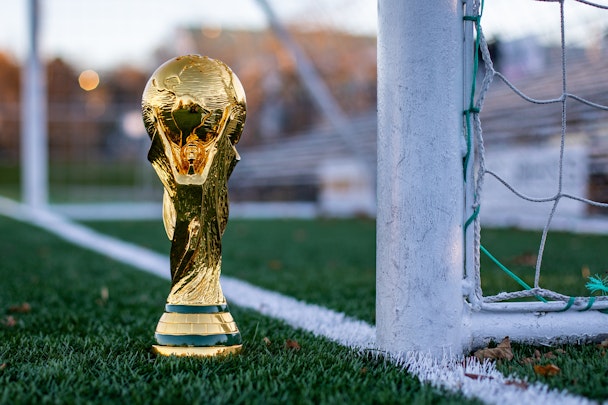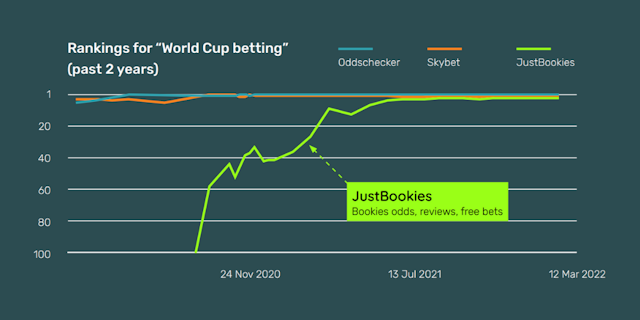Sports betting brands have extra time before the World Cup – so spend it link-building
The 2022 Fifa World Cup will, when it finally arrives in November, bring plenty of on-the-pitch competition. But off-pitch competitions are already heating up: for betting companies, advertisers and all sorts of other players to gather the biggest possible share of the buzz the tournament will generate. For The Drum’s Sports Marketing Deep Dive, Justin Deaville, managing director of agency Receptional, tells us that now’s the time to start the fight for share of attention by focusing on SEO.

How should advertisers and betting companies be preparing for this year’s Fifa World Cup? / Rhett Lewis via Unsplash
The World Cup. It’s the world’s largest sporting festival. It is an event like no other, filled with emotion and hope.
For sports betting brands, there are enormous opportunities – especially in search engine optimization (SEO), with millions of searches around the event. But the Qatar World Cup will be a little different to normal.
Firstly, it takes place in November and December, mid-way through the domestic football season. This will help operators to acquire first-time bettors and convert existing domestic bettors to the World Cup.
Secondly, teams from all of sports betting’s emerging markets have qualified – Brazil, Canada, Germany, the Netherlands and the USA. This might help to retain first-timers for other sports and/or tournaments.
With this level of opportunity, our advice for Qatar 2022 is simple: plan ahead, launch early and match your budget to your objectives (competition will be fierce).
The early bird catching the World Cup worm
Already, several thousand people are making ‘World Cup odds’-related searches every month. By the time the tournament kicks off, we predict 300,000+ searches a month.
Who’s ranking in the top three positions on Google? In the UK, the top two spots are taken by OddsChecker and Skybet. In third place is a lesser-known brand, JustBookies.
The brand launched its campaign early. The site started ranking for World Cup keywords at the end of 2020 and is now well-positioned ahead of the tournament. As keyword volumes increase, JustBookies will benefit.

Which markets present the biggest opportunity?
In emerging markets, look at the search volumes for ‘football betting’ (or the closest relevant translation) and the number of links you might need to build to rank for them.
At Receptional, we focus on building links with a domain rating (DR) of 25 or above. In the UK, you’d need between 135 and 560 of these links in order to rank in the top three spots on Google for ‘football betting.’
In the Netherlands, you’d need between five and 150 links to get to the top of page one. For new entrants, this may be a better opportunity than competing in the UK.
We can conduct a similar analysis for any country to understand the level of demand, the level of competition and the likely return on investment (ROI).
These numbers are a rough guide, but your strategy should be based on your business needs and the existing link profile of your site.
If you’re to be successful, you need good-quality links; great content is the key to generating great links. For example, our team of journalists produces 7,500 pieces of content a year. Lots of brands will be spending on link-building, so the picture we see today is likely to change quickly in the coming months.
Looking at the competition
Operators are using three tactics to generate high-quality links.
1. The old-school approach
Apologies if you work in BetFred’s marketing team, but this approach – a sponsored post with a no-follow link that’s useless for SEO purposes – is old school. I love The Manchester Evening News, but this article is almost worthless from an SEO perspective.
2. The brand-led approach
Much more interesting is the approach from foreignpolicy.com, which has an impressive DR of 86. The link appears in a highly prescient piece of journalism from 2021, forecasting conflict between Ukraine and Russia and including, perhaps surprisingly, links to the OddsChecker website.
OddsChecker got this link because its brand is known for publishing betting odds. In such a competitive market, a clear brand proposition will help you stand out. What does your brand stand for? And how might you use (or create) unique selling points to help you generate links?
3. Ambassadors
Another link for OddsChecker, this time from an ambassador campaign. Operators and affiliates often work with former sports personalities to promote their brand. In this case, former footballer Dimitar Berbatov contributed to a match preview, funded by OddsChecker.
The resulting article featured in The Week, with a link back to the OddsChecker website. The Week has a DR of 85 – a very nice link.
Hopefully these examples will help inform your link-building tactics ahead of Qatar 2022. If you’re looking for further advice, check out our ebook: SEO: How to Attract First-Time Depositors at the Qatar World Cup.
Check out The Drum’s latest Deep Dive, The New Sports Marketing Playbook, and learn the tactics employed by the world’s biggest sports organizations and their star athletes to stay at the top of their game.
Content by The Drum Network member:

Receptional
Founded in 1999, just a year after Google, Receptional is an award-winning agency that's remained at the forefront of digital marketing for over 20 years.
A...

